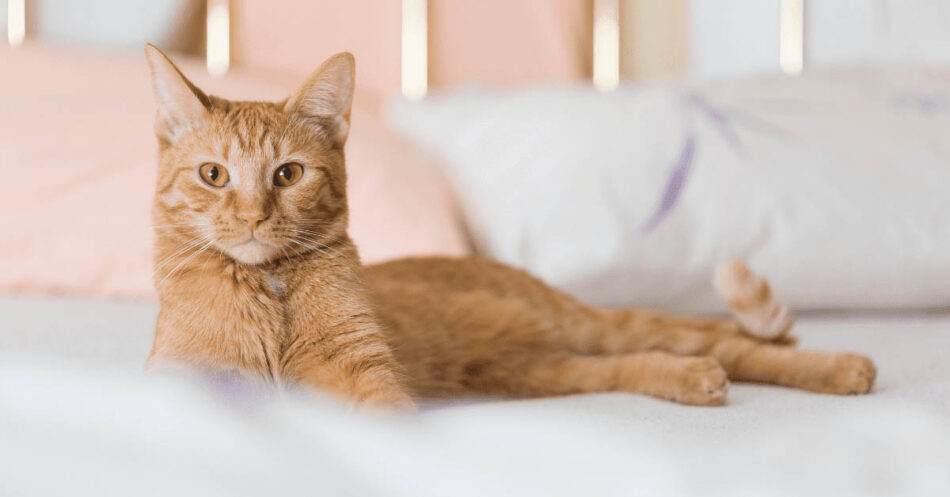
How to Stop a Cat from Spraying Indoors
This post may include affiliate links. Please read my disclosure policy.
Spraying, or marking, is something not all cats do, but when yours decides to call out a spot in your house for his personal marking, it’s hard to think of a more offensive cat behavior.
My cat, Max, was a sprayer. And of all the places he picked to mark his territory, it was my stovetop! The smell permeated everything to the point where I couldn’t even use my oven or stovetop for quite some time.
What Is Spraying?
Your cat sprays to mark his territory, much like some dogs will urine mark. But what’s the difference between cat spraying and urine marking?
Essentially, it’s in the position your cat assumes. When it comes to cat spraying, cats will back up to a standing object. It might be a wall, a chair leg, or another piece of furniture. They raise their tail erect and squirt urine, usually on vertical surfaces.
When cats urine mark, they’ll squat just as if they’re peeing normally and they’ll do this on a flat surface, like your carpet or your bed.
In both scenarios, the behavior is intentional and not a matter of their inability to “hold it.” It’s purely a behavioral issue.
What about female cats? Do female cats spray? Yes, female cats spray too. This behavior is not limited to male cats. Although I’ve never had a female cat that sprayed, it’s fairly common.
But why do cats spray?
Why Does Your Cat Spray
There are several possible reasons for cat spraying. Take a look below and see which resonates with your cat. And remember, there could be more than one reason, as was the case with my cat, Max.
Spraying Reason #1: Stress
Cats are most certainly creatures of habit. Have you changed anything in your cat’s environment? What about his routine? In Max’s case, we had recently moved into an apartment while we were waiting for our house to be built.
Just like how humans cope with stress by engaging in certain soothing rituals, cats may use urine marking, or spraying, to relieve their stress by marking out their boundaries. They may try to self-soothe by creating their own “safe space.” This is one way that cats communicate their stress to humans.
So think about your life recently. Have you moved? Have new family members been brought into the home? Has your routine changed?
Spraying Reason #2: Medical Issues
If your cat has stopped using all the litter boxes you have in your home or if he urinates right in front of you, it’s time to see your veterinarian. A urinary tract infection may be responsible for abnormal urination behavior.
Kidney disease may also change urinary habits, including frequency of urination.
Since cats can’t verbalize when they’re in trouble, they may use changed behavior to signal to you that something is wrong and they’re experiencing a medical problem.
Spraying Reason #3: New Pets
In Max’s case, it wasn’t just that we had moved into a new apartment; it was also that he was sharing this new space with two other male cats. And while they weren’t new to him, he felt it important to stake out his turf in our new digs.
If you’ve recently adopted a cat, dog, or another animal, your cat may be feeling threatened and may simply want to establish that this is his territory. He may also be upset when he sees outdoor cats or other animals outside his home, hence the behavior.
And if you’ve thought sharing a litter box was fine, think again! Cats need a lot more “bathroom space” than they’re often given.
Just how much? Dr. Liz Bales recommends one litter box per cat plus one. So if you have multiple cats, you’ll need the same number of litter boxes plus one!
Check out the rest of her litter box secrets here, which can be particularly helpful if you have a multi-cat household.
Spraying Reason #4: Your Cat Isn’t Neutered
Do neutered cats spray? An indoor cat that isn’t spayed or neutered will have a strong desire to spray or mark their territory. Get your cat spayed or neutered before they’re five months old. Most of the time, this prevents urine marking behavior from developing in the first place.
If you’ve adopted an older cat, you can still get him neutered, and most of the time, this will end urine spraying behavior.
How to Stop Your Cat from Spraying
Did you discover the reason for your cat’s indoor urine marking? Now it’s time to match the spraying cause to the spraying solution!
Spraying Solution #1: Curb the Stress
If you’ve recently moved, it may take some time for your cat to feel comfortable in his new home. Start by providing small boundaries for him, perhaps giving him access to one room or a small section of the home to start.
If a new person has been introduced into the family, make sure to give them and your cat plenty of time to bond through positive experiences.
Another thing that might be causing stress to your kitty is a change in his routine. The changes may be subtle to you, but anything that disrupts a cat’s routine can cause them to feel anxious.
A consistent schedule for feeding, play, and affection reduces stress and anxiety in cats, which are common triggers for spraying. Having stability in your cat’s life will make him feel more secure in his environment, lessening his need to mark territory through spraying.
If your indoor cat, particularly if he’s an intact male cat, starts spraying near doors or windows, it’s often because he’s stressed by outdoor cats or animals near his home. You can help him by blocking his view of the outside by using curtains or blinds or moving cat trees near windows somewhere else that he’ll be comfortable with. This reduces his stress by preventing him from seeing the animals that are upsetting him.
In addition, pheromone therapy can produce wonderfully calm behavior in cats. I use this diffuser from Feliway in my house. It emits pheromones that mimic those of a nursing cat mother, calming your cat naturally.
For more about pheromone therapy, see this post from Dr. Liz Bales, the “Cat-vocate.”
Other natural and effective therapies that can be used during transitional periods include Zylkene. This capsule is lactose-free and contains a naturally soothing milk protein. It’s safe for both short- and long-term use, so it’s perfect if your cat just needs to get over the “hump” or if the situation is long-lasting.
Spraying Solution #2: See Your Veterinarian
If your cat’s inappropriate urination is related to a medical condition, it’s important to see your veterinarian right away. Kidney disease and urinary tract infections are nothing to play around with, so be sure to book an appointment immediately.
If you need a refresher on kidney disease symptoms, please read this post.
Spraying Solution #3: Help Your Pets Adjust to Each Other
Often, this is just a matter of time. But don’t force the issue! Remember, multiple cats shouldn’t share a litter box, and make sure each box is sized appropriately for each cat.
The ideal size for a litter box can be measured from the length from your cat’s nose to the tip of his tail, plus another fifty percent. And most cats prefer a non-hooded litter box. This is the one I used for my cat, Olivia.
Spraying Solution #4: Neuter or Spay Your Cat
Remember, most spraying behavior can be eliminated by getting your female or male cats spayed or neutered. Aside from that, spaying or neutering your cats will reduce the risk of reproductive cancers and decrease aggressive behavior. Thus, spayed female and neutered male cats live longer, healthier lives.
You can do this even at five months old, and typically your cat will never start spraying in the first place.
Spraying Solution #5: Use a Cat Spraying Deterrent
If you’ve tried all the solutions above without success, then it’s time to try a deterrent spray! Cats are naturally repelled by certain essential oils and odors, like the ones contained in this deterrent spray. It’s safe for most surfaces and won’t leave any stain marks behind. You can even use it on your plants!
Spraying Solution #6: Switch Your Litter
If you have plenty of enrichment toys and cat trees and there are more than enough litter boxes in your home, maybe the problem with your cat’s urine spraying is with the litter she uses.
If you’ve been following me for a while, then you know I love World’s Best Cat Litter™. Their Attraction Action® Formula is specifically made for kitties who are having trouble or just flat-out refusing to use the litter box. This high-performance litter has a natural, plant-based additive that safely draws your cat to the box. Try Attraction Action® to stop any more litter box problems.
How to Clean Up Cat Spray and Get Rid of the Smell
Cat urine is…pungent! And it’s notoriously difficult to get rid of. I couldn’t use my oven or stove for months after Max began spraying on it.
That was before I learned about the right way to clean up cat pee and get rid of the smell for good.
Once you’ve identified why your cat sprays and found the appropriate solution, you’ll need to revisit the scene of his crime and clean it properly.
Certain enzymatic cleaners, like this one from Kinderbean, are designed not just to clean the mess but eat up the bacteria that cause pet odors. Once the odor is gone, your cat is far less likely to spray there again.
Here’s the step-by-step process to effectively clean up cat urine.
Tools:
- White terry cloth rag or towel
- An enzyme cleaner like this one
For Kinderbean No Stress Mess Eraser, here are the steps for soft surfaces:
Step 1: Soak. Shake your bottle well then saturate the stained area and just beyond its border. Be sure to fully soak but not flood the area.
Step 2: Rub. Gently rub the product into the stain with the bottom of the bottle then cover it with a clean damp cloth. Leave for several hours (or overnight if you can).
Step 3: Air dry. Remove the cloth and allow the area to air dry for 12-24 hours for best results.
For hard surfaces, only leave the product on for 15 minutes for sealed surfaces and 5 minutes for non-sealed ones.
If you’re using a different enzymatic cleaner brand, please check its label for specific directions.
If the stain is deep or has been there a long time, you may need to repeat this process. However, once the odor is gone and you’ve gotten to the root of your cat’s spraying behavior, your house should once again become pee-free!
I’m happy to say that Max did eventually quit his nasty spraying habit. It took time, patience, and understanding of what he needed to feel safe and calm, but we managed to once again have a clean home.
Your cat’s health and happiness are important! Be sure to download the free cat health checklist below and learn how to take your cat’s vital signs at home so your next visit to the veterinarian will be well informed.


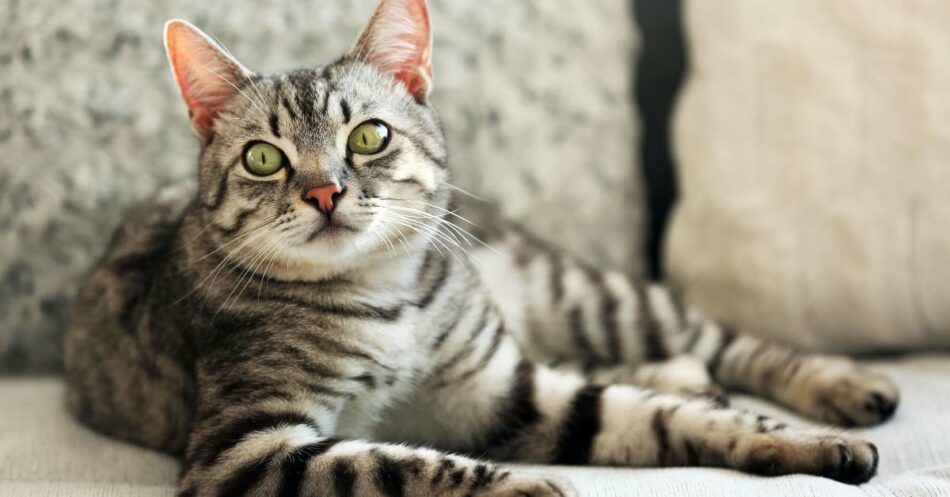
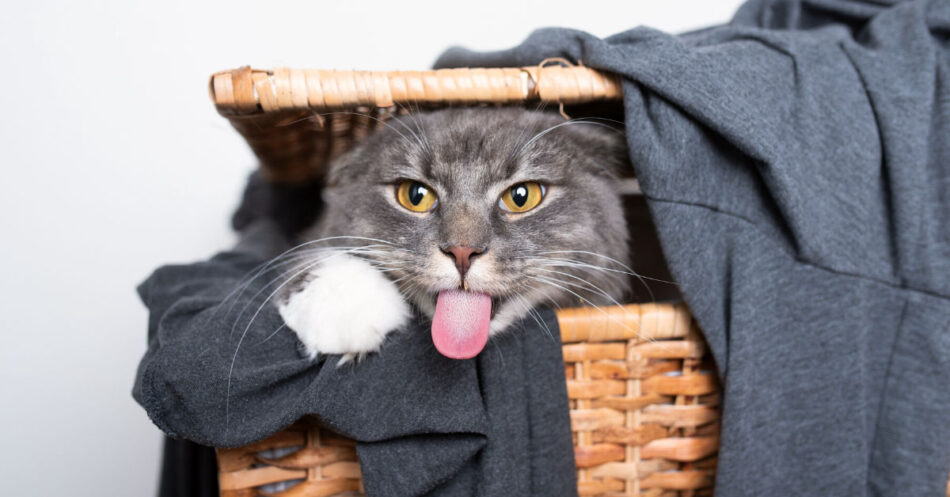
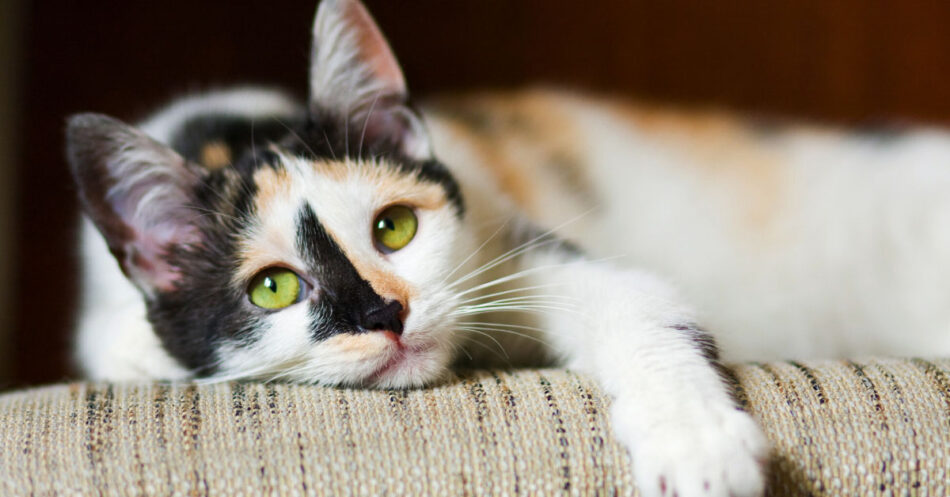
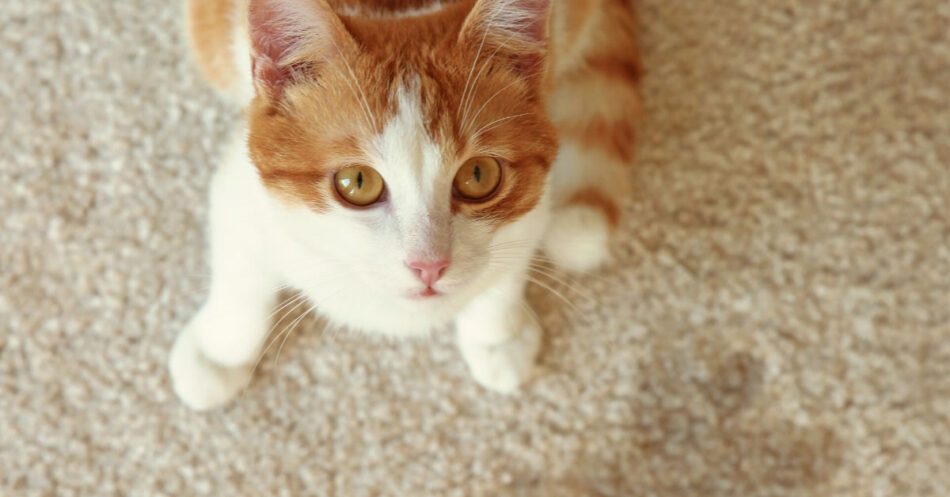
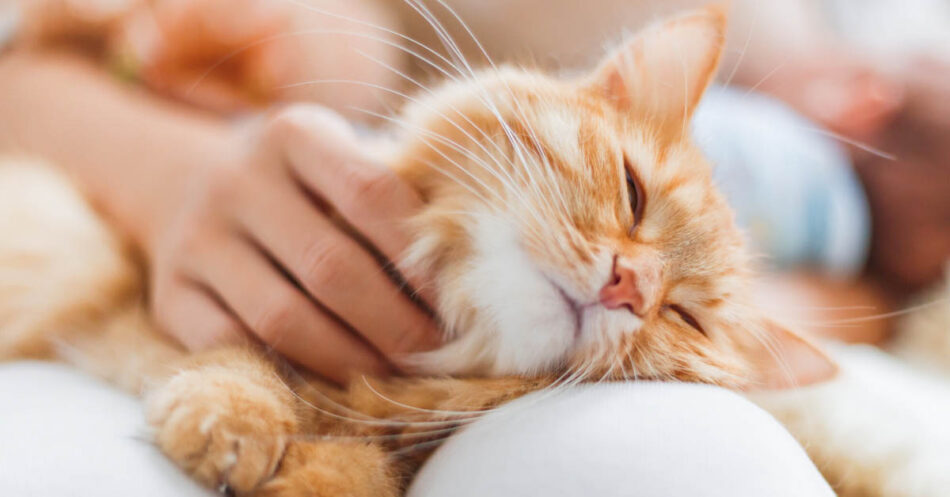
One of my 4 cats has started spraying. He is 6 yrs old and was neutered as a kitten by the rescue group before we adopted him, so at a young age. I want to say reading your words, “I’m happy to say that Max did eventually quit his nasty spraying habit. It took time, patience, and understanding what he needed to feel safe and calm, but we managed to once again have a clean home” have done a lot to help ease my anxiety over this.
We were away on vacation for a week. My 2 adult sons cared for the cats. Some altercation must have taken place between Mickey (the one spraying) and our other 6 yr old cat, Oliver, because Mickey seems afraid of Oliver. Runs and hides when Oliver attempts to play.
I’m going to work hard at getting him past this. Your article helped me create a plan.
Monica,
I’m happy this post helped alleviate some of your stress with this situation. It may take some time to curb your cat’s spraying, but don’t give up hope! From your description, it sounds like Mickey is experiencing some stress and trying to mark his territory among the other cats. Definitely try some of the solutions in the blog post. And if the problem persists, talk with your veterinarian about your concerns. Please keep me posted!
I never see my cat spray but the odor is unmistakable. How do I treat the smell when I’m not see where she is spraying? The odor is strong in two rooms.
You’re right, the smell of cat urine is unmistakable. Since you haven’t caught your kitty in the act, have you tried using a blacklight light, like this UV Stain Detective light. It can help you detect any dry urine stains so that you can effectively clean the area, remove the odor, and discourage your cat from returning to the scene of the crime! I highly recommend that you use an enzymatic cleaner like this one. Instead of masking bad smells, enzyme cleaners work by destroying the odor and stains. I hope this helps!
Kristen
I have 5 cats and they seem to spray territorilly, especially when there are other cats or critters outside. One likes to pee in the laundry sink or on the washer, I’ve tried sprays, litter boxes are cleaned daily and still they still do it. Any advice?
Mike, that’s a frustrating problem. Seeing other cats or critters wandering through your yard can certainly trigger a cat’s desire to mark his territory. Some cats are more territorial than others. Have you tried closing the blinds on your windows when your cats notice other animals outside? If your cats are feeling stressed, it can also help to give them extra attention and extra playtime to soothe any anxiety. And I strongly recommend cleaning with an enzymatic cleaner like this one. Not only will it clean the mess, but it actually eats up the bacteria that cause the odors. Once the odor is gone, your cats are far less likely to spray there again.
I have 4 cats. They are all indoor cats. In the past year my husband began letting one of them go outdoors. Since then, I’ve noticed a significant uptick in spraying daily and in multiple areas. But we haven’t been able to determine who is marking, one of the indoor cats or the outdoor cat. Would this change cause one to mark?
Mayra, that’s a great question. That change in behavior could definitely be the cause of the increased spraying among your cats. Indoor/outdoor cats can get so overstimulated when they are outside, (and possibly in contact with other animals), that they spray when they come inside. At the same time, this change in routine, could be affecting your indoor cats. The fact that one of their housemates comes and goes could be just enough change to trigger this territorial behavior. Have you tried this calming diffuser from Feliway? Try placing it in the areas where that are frequently sprayed. I also recommend using an enzymatic cleaner like this one to clean up the mess and discourage your cats from spraying in the same spot.
Hi, we have two kittens both about seven months old, one female and the other male. They are indoor cats and unaltered (not neutered and not spayed). Our male cat is marking by urinating. Is there any way to teach the male cat not to mark by urinating other than neutering which we don’t want to do?
Thanks
The urge to spray is extremely strong for unaltered cats, especially in multi-cat homes with female cats. You can try Feliway. It’s a pheromone diffuser that can help curb unwanted behavior like spraying. And you’ll definitely to use an enzymatic cleaner like this one to remove the odor causing bacteria where your cat sprays. You can also try making previously soiled areas inaccessible or unattractive to discourage your kitty.
Kristen
My cat has been spraying for a while. I know he is anxious but we haven’t found anything to do about it. He sprays in the corners of rooms with carpet or on clothes. He seems to do it more on silky clothes for some reason. He hates the smell of the spraying deterrent that we use and seems so sad towards me when I put it in my room. What do I do?
I’m sorry to hear that! Have you talked to your veterinarian about your cat’s anxiety? They may have some great suggestions to help your kitty regain his calm. This natural supplement is great for helping cats who suffer from anxiety. As for your cat’s spraying, I strongly recommend using an enzymatic cleaner. It not only removes odors, but it destroys the bacteria that causes the odor, discouraging your kitty from returning to the scene of the crime. Try this one.
I have a cat that we adopted from the pound exactly a year ago. About 4 months ago, he started spraying (he’s been fixed). After numerous visits to the vet, I was told that he’s stressed. The only thing I can think of is there may be a cat roaming in the neighborhood that I don’t see but he does. He’s spraying in places I can’t find but can smell. Per the vets orders, he has 2 litter boxes, is on a special diet, I ordered a cat tree for him so he could be up high and none of this has stopped the spraying. I even bought the Stop orange spray from Amazon but that doesn’t stop him from spraying in the same areas. I’m at a loss and don’t know what to do next. He’s an indoor cat so my only other option would be to try and let him roam outside but I don’t like that idea. Any suggestions?
Melissa, I’m so sorry you have such a frustrating problem on your hands. But you may be onto something about neighborhood cats getting your kitty stressed out. Spraying is essentially a way for a cat to mark their territory. If your kitty sees the neighborhood cat or even smells their sent, that could be enough to get him to start spraying. Have you tried blocking your cat’s visual access by closing curtains or blinds? That may help.
It also sounds like you got some great advice from your vet to help manage your kitty’s stress. Another naturally calming solution that I love is this Pheromone Diffuser by Feliway. It mimics a cat’s natural pheromones helping them feel calmer in stressful situations. It can even help curb stress related behaviors like spraying.
This is another calming, vet recommended option. It’s clinically proven to relieve stress without making your kitty drowsy. And it’s great for short term or long term use.
I hope this helps you and your cat!
You can avoid letting your cat loose but still give them a great outside experience. You can put up a large outside kennel in your yard equipped with climbing structures and a waterproof house. (Some people even attach theirs to the house over a door or window so the cats can go out at will. You can even make one to go on your porch if you don’t have a yard) Lock it with a bicycle lock so no one will let him out. You can make it as big as you are able. Buy it at a livestock supply place ready to put up or build one yourself. You can cover it with a tarp or use shade cloths on part of it. Add or change things for him to play on or with regularly. You don’t even have to spend alot of money. Large pieces of drift wood or rocks & boards placed at angles will give him plenty to do. You can even put ladder or an outdoor chair in there for him or you to sit on. Stack some outdoor tables. Hang toys from the ceiling, etc. Get creative. Your cat will love it. Mine do. They even enjoy climbing the walls! They are so happy to be out there & get plenty of exercise and never seem bored.
I have a neutered male 12 that was raised with a bulldog. He has never sprayed. The bulldog passed and the neighbors male cat (also neutered) keeps coming in through the doggy door and sprays. Also, a new small female showed up. She is now fixed and stays Inside. I can’t block the doggy door because of my male. Any suggestions on getting the neighbors cat to stop spraying?
RJ,
Thanks for your question. A neutered cat who sprays may be marking his territory. And it sounds like your neighbor’s cat is trying to lay claim to your home and let your other cats know this is his domain now! Since you can’t block your doggy door, are there any other things you can do to discourage your neighbor’s cat from coming over? If you aren’t already, I’d suggest not leaving any food or treats out for the visiting kitty. Without any incentives, his visits may become fewer and fewer.
Also, be sure to clean with an enzymatic cleaner like this one by Rocco & Roxie. Instead of masking odors, it destroys the bacteria that causes them. As a result, cats may be less likely to return to the scene of the crime.
I have two dogs and two cats. Unfortunately the youngest cat who is almost 4 yrs old doesn’t get along with any of the other pets. Just recently she started spraying in the house and urinating on the dogs beds. Because of her bad habits she’s only allowed indoors under supervision and now we have to put the dogs beds up when she’s in the garage. I would like to figure out how to get her to stop rather than give her away. She’s my 18yr old daughter’s cat and helped her through her own anxiety. I really need help because my husband is getting impatient with Ally’s bad behavior.
Trisha,
I feel your pain, the thought of re-homing a beloved pet is heartbreaking. Have you taken Ally to your veterinarian to rule out any potential health issues that could be contributing to her behavioral problems? Consulting with a Certified Cat Behaviorist may also be a great help.
Anxiety could be at the root of her bad habits. Have you tried, this pheromone diffuser by Feliway? It’s vet recommended and helps reduce the tension in multi-cat families.
Cats will often spray and refuse to use their litter box when they feel anxious or threatened. Since Ally doesn’t get along with the other animals and lives part of her life outdoors, she may be perceiving a lot of things as territorial threats, which prompts her spraying.
Also, to help your kitty with her pee problems, make sure you have enough litter boxes in the home. A good rule of thumb is to have one box per cat, plus one more box. This can also help cut down on any aggression or territorial tension between the cats in the household. And hopefully, it will encourage your kitty to use the litter box and not the dog beds.
I hope this helps you and your fur family!
my cat is about to be 2 yrs old never neutered and he sprays on my furniture or in the corner, how can i get him to stop, without having the surgery or should I take him to be neutered?
Hi Denise,
If your cat doesn’t have any underlying medical problems and you’ve tried addressing their stress and any possible litter issues, neutering your cat may be the answer. Your veterinarian can help determine if that’s the best solution for your cat.
Hope this helps!
Kristen